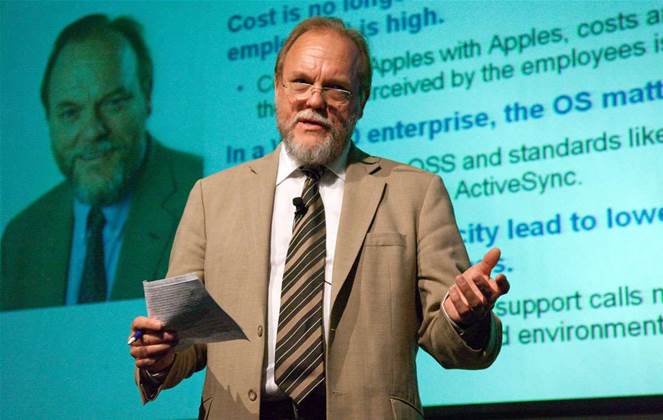In a bizarre game of give and take, Apple and Microsoft are both picking away at different sides of the enterprise mobile phone market.

At one end, Apple's iPhone is being pushed into the enterprise because so many employees are demanding they be allowed to use the device.
At the other end, Microsoft has enabled easy integration of the iPhone to the enterprise by licensing its ActiveSync technology to Apple - and Google, Nokia, IBM etc.
 |
| Robin Simpson at Gartner's ITxpo in Sydney last week |
Robin Simpson, research director for enterprise mobility at Gartner, says that despite Windows Mobile continuing to lose ground against its competition, Microsoft has found itself in an enviable position when it comes to managing a wide range of those devices on an enterprise network.
"All of a sudden Exchange has become the de-facto standard for email interoperability on mobile devices.
"Microsoft realised it doesn't have a high market share of the smartphone - about nine percent ... I think [Microsoft] realised its stranglehold on the server market for mobile email was under threat unless it opened up [the protocols]," said Simpson.
Although, as Simpson suggests, Microsoft only opened its protocol under threat of losing everything, the increasing demand from employees to use their own technology in the enterprise means Microsoft's future in this space looks bright.
"The biggest question we get [from clients] is, 'how do I support choice ... particularly for mobile email?' and the answer is that if you are using Exchange ActiveSync there is now an answer. Even some of the competitors to Exchange, like IBM Lotus Notes Domino, have adopted Exchange ActiveSync as a way of connecting to all these mobile devices.
"There are some interesting changes coming. We have a standard but it has come from Microsoft ... Mobile device management is still a huge problem and nobody has a good solution to that. Microsoft could own it if they wanted to," said Simpson.
OS X in the enterprise
Moving beyond iPhones to notebooks and desktops, Apple could start generating big bucks by exploiting the 'halo effect', which has already been cited as the reason for booming Mac sales.
"[iPhone owners] discover usability, they discover simplicity and they start to look at Mac," said Simpson.
This is unlikely to happen, claims Nick Jones, a Gartner UK analyst, specialising in mobile and wireless. According to Jones, Apple has no desire to sell into the enterprise and he believes that any enterprise considering Apple products should first consider the issues of cost and planning.
 |
| Nick Jones at Gartner's ITxpo in Sydney last week |
"If you start using Macs in your enterprise, you start having to play silly games like running two operating systems. So you are now paying to support two operating systems on one machine. It costs you 58 percent more to have a Macintosh in your company than it does to have a PC because of this.
"Tell me if you think you are going to get 58 percent more work out of your employees if you gave them a Mac rather than a PC," he asked.
Simpson agrees that OS X isn't "the right kind of platform for the traditional enterprise" but he claims technologies such as web services and virtualisation make the Mac platform a serious alternative.
"In that environment, a computer that has a standards-based web browser works reasonably well. The main virtualisation engines have clients for Mac and they run very, very well. You can run Windows XP, Windows 7, Vista on a Mac inside a 'bubble' that the enterprise can control from a managed SOE point of view.
"It is one more example of the kind of flexibility that virtualisation brings and is one way of managing an otherwise unmanageable device and giving the employees or contractor some choice to use their own computer but still keeping it safe," said Simpson.
Jones isn't convinced and highlights Apple's lack of a product roadmap as the final indication of the Mac's unsuitability for enterprise use.
"Enterprise vendors give you things like roadmaps - they tell you what is going to happen. If you want to find out what is going on with Apple you have to watch Steve Jobs at the next Mac conference. Not exactly a basis for solid planning, I would say.
"I don't believe Apple is an enterprise vendor, I don't think Apple has any financial incentive to become an enterprise vendor," added Jones.



_(36).jpg&h=140&w=231&c=1&s=0)







 Cyber Resilience Summit
Cyber Resilience Summit
 iTnews Executive Retreat - Security Leaders Edition
iTnews Executive Retreat - Security Leaders Edition
 Huntress + Eftsure Virtual Event -Fighting A New Frontier of Cyber-Fraud: How Leaders Can Work Together
Huntress + Eftsure Virtual Event -Fighting A New Frontier of Cyber-Fraud: How Leaders Can Work Together
 iTnews Cloud Covered Breakfast Summit
iTnews Cloud Covered Breakfast Summit
 Melbourne Cloud & Datacenter Convention 2026
Melbourne Cloud & Datacenter Convention 2026












_(1).jpg&h=140&w=231&c=1&s=0)



